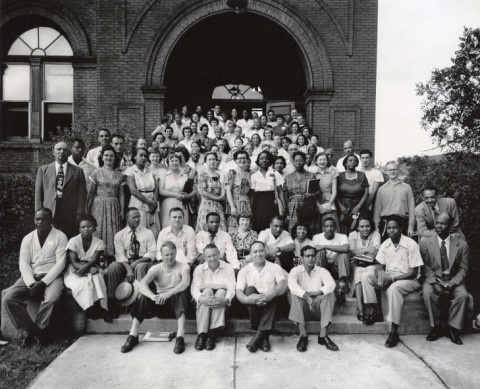
In 1944, sociologist Charles S. Johnson launched the Fisk University Race Relations Institute (RRI), which ran until 1969. His goal was to identify the social, political, and economic policies and practices that limited opportunities for Blacks and other marginalized racial groups and contributed to racial unrest in the U.S. The RRI differed from the other estimated 400 organizations working to address racial tensions during the 1940s because Johnson built it upon the work of an integrated group of trained scholars (anthropologists, sociologists, economists, psychologists, and educators), college students, and professionals from various fields. Their goal was to provide “intelligent and effective” social action through a series of invited lectures, panel discussions, and workshops. (An early group of participants is shown in this photograph, copyright Nashville Public Library.)
An annual institute for Iowa
This summer, Ain Grooms and Katrina Sanders, professors of Educational Policy and Leadership Studies, and DeeAnn Groves, a fellow at West Wind Education Policy in Coralville, are working to plan the University of Iowa College of Education Annual Summer Racial Justice Institute. As part of the Obermann Interdisciplinary Research Grant program, the trio are building on Johnson’s Institute to address current racial tensions. They envision an annual event that is facilitated by interdisciplinary scholars, students (both graduate and undergraduate), and community leaders. With scholarship undergirding the Institute’s offerings, their goal is to offer K-12 educators, community members, business owners, medical professionals, law enforcement, and concerned citizens a much needed opportunity to gain a holistic understanding of the historical and contemporary experiences impacting racially minoritized populations.
Each team member brings particular expertise to the project. Grooms uses the intersection of race, place, and socioeconomic class to examine the impact of historical and contemporary educational policies—including school desegregation, school choice, and the retention of educators of color—on student achievement. Sanders, who helped integrate her Catholic K-8 school during the 1970s, has conducted extensive research on the RRI and taught more than 3,000 pre-service teachers in a DEI course. Grove creates assessment tools and analyzes data to understand the knowledge and skills educators possess to advance racial equity; she is also trained in many of the practices schools are currently using to advance equity, including instructional rounds, student-centered coaching, and restorative practices.
During the course of their four-week IDRG project, the three scholars will work toward a highly developed plan for the first Institute, which they plan to launch next summer. This includes everything from the theoretical work of identifying the best pedagogical approaches for their intended outcome to the practical task of creating budgets. It is their hope that this Institute, inspired by the past but informed by the current moment, will demonstrate the UI’s and the College of Education’s commitment to education for the public good, bettering race relations, and improving the lives of racially marginalized populations in Iowa, the Midwest, and around the country.